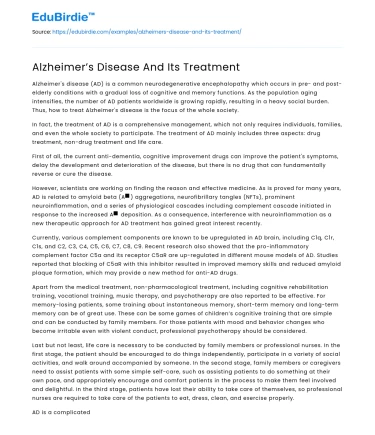Alzheimer's disease (AD) is a common neurodegenerative encephalopathy which occurs in pre- and post-elderly conditions with a gradual loss of cognitive and memory functions. As the population aging intensifies, the number of AD patients worldwide is growing rapidly, resulting in a heavy social burden. Thus, how to treat Alzheimer's disease is the focus of the whole society.
In fact, the treatment of AD is a comprehensive management, which not only requires individuals, families, and even the whole society to participate. The treatment of AD mainly includes three aspects: drug treatment, non-drug treatment and life care.
Save your time!
We can take care of your essay
- Proper editing and formatting
- Free revision, title page, and bibliography
- Flexible prices and money-back guarantee
First of all, the current anti-dementia, cognitive improvement drugs can improve the patient's symptoms, delay the development and deterioration of the disease, but there is no drug that can fundamentally reverse or cure the disease.
However, scientists are working on finding the reason and effective medicine. As is proved for many years, AD is related to amyloid beta (Aβ) aggregations, neurofibrillary tangles (NFTs), prominent neuroinflammation, and a series of physiological cascades including complement cascade initiated in response to the increased Aβ deposition. As a consequence, interference with neuroinflammation as a new therapeutic approach for AD treatment has gained great interest recently.
Currently, various complement components are known to be upregulated in AD brain, including C1q, C1r, C1s, and C2, C3, C4, C5, C6, C7, C8, C9. Recent research also showed that the pro-inflammatory complement factor C5a and its receptor C5aR are up-regulated in different mouse models of AD. Studies reported that blocking of C5aR with this inhibitor resulted in improved memory skills and reduced amyloid plaque formation, which may provide a new method for anti-AD drugs.
Apart from the medical treatment, non-pharmacological treatment, including cognitive rehabilitation training, vocational training, music therapy, and psychotherapy are also reported to be effective. For memory-losing patients, some training about instantaneous memory, short-term memory and long-term memory can be of great use. These can be some games of children’s cognitive training that are simple and can be conducted by family members. For those patients with mood and behavior changes who become irritable even with violent conduct, professional psychotherapy should be considered.
Last but not least, life care is necessary to be conducted by family members or professional nurses. In the first stage, the patient should be encouraged to do things independently, participate in a variety of social activities, and walk around accompanied by someone. In the second stage, family members or caregivers need to assist patients with some simple self-care, such as assisting patients to do something at their own pace, and appropriately encourage and comfort patients in the process to make them feel involved and delightful. In the third stage, patients have lost their ability to take care of themselves, so professional nurses are required to take care of the patients to eat, dress, clean, and exercise properly.
AD is a complicated disease in which there are many unknowns, but treatment can help delay symptoms and improve quality of life. In addition to the mentioned complement research for AD, there are many other researches being studies all over the world. It is believed that in the future, scientists will know more about AD and find a way to cure patients suffering from it.






 Stuck on your essay?
Stuck on your essay?

